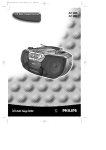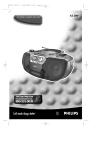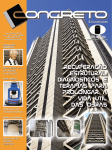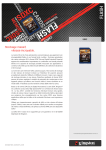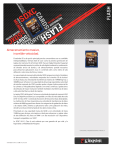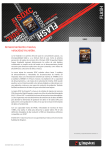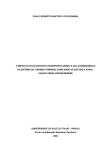Download Philips AZ1007 User Guide Manual - DVDPlayer
Transcript
AZ 1005 AZ 1007 CD Radio Cassette Recorder POWER DBB BASS BOOST DYNAM IC VOLU ME PAUSE STOP -OPE N SEA RCH 10 PLAY 10 4 10 D 0 96 92 88 MHz kHz 150 kHz 530 D N A B • FM • LW • MW FM SHUFFLE SEARCH CD MO DE STOP PLAY•P AUSE CD RA CD RADIO DIO CA CASS SSET ETTE TE RE RECO CORD RDER ER DYN A M IC BAS SB OOS 250 1300 8 REC OR T Downloaded From DvDPlayer-Manual.com Philips Manuals 175 200 800 225 1000 FM 280 LW 1600 MW TUN NIN G 1 3 1 2 9 0 ! 8 POWER DBB BASS BOOST DYNAM IC VOLU ME PAUSE STOP -OPE N SEA RCH FM 280 LW 250 1600 1300 10 PLAY 8 4 10 D 0 REC OR 10 96 4 6 92 88 150 MHz kHz kHz530 175 630 200 800 225 1000 MW TUN NIN G D N A B FM • W L • MW • SHUFFLE SEARCH CD MO DE STOP PLAY•P AUSE CD RA DIO CA SSET TE RE CORD ER DYN A M IC BAS SB OO 7 ST 5 2 @ # $ % ^ AC MAINS Downloaded From DvDPlayer-Manual.com Philips Manuals 3 CONTROLS English TOP AND FRONT PANEL 1 Source selector - to select source of sound: CD-RADIO-TAPE and also the POWER OFF switch 2 VOLUME - to adjust volume level 3 DBB - Dynamic Bass Boost: for a more vivid bass response CASSETTE RECORDER: 4 PAUSE ; - to interrupt recording or playback STOP•OPEN 9 / - to stop the tape and to open the cassette holder SEARCH 5 or 6 - to fast wind/rewind the tape PLAY 1 - to start playback RECORD 0 - to start recording 5 Cassette compartment CD PLAYER: 6 CD Display - to show the CD functions 7 PLAY•PAUSE 2; - to start or interrupt CD play STOP 9 - to stop playback or erase a programme POWER SUPPLY CD MODE - to select a different play mode, e.g. SHUFFLE/REPEAT; to programme and review programmed track numbers SEARCH ∞ or § - to skip or search a passage/ track backwards or forward 8 LIFT TO OPEN - to open/ close the CD door RADIO: 9 BAND - to select FM/MW wave band 0 Tuning dial pointer ! TUNING - to tune to radio stations BACK PANEL @ Battery door - to open the battery compartment # BEAT CUT switch - to eliminate any whistle tones during MW recordings $ Telescopic aerial - to improve FM reception % p - 3.5 mm stereo headphone socket Note: Connecting headphones will switch off the loudspeakers ^ AC MAINS - socket for mains lead BATTERIES Whenever convenient, use the mains supply if you want to conserve battery life. The battery supply will be switched off when the set is connected to the mains. Make sure you remove the plug from the set and wall outlet before inserting batteries. Batteries (optional) 1. Open the battery compartment and insert six batteries, type R20, UM1 or D-cells (preferably alkaline) with the correct polarity as indicated by the (+) and (-) symbols inside the compartment. 2. Replace the compartment door, making sure the batteries are firmly and correctly in place. The set is now ready to operate. – Incorrect use of batteries can cause electrolyte leakage and will corrode the compartment or cause the batteries to burst. Therefore: – Do not mix battery types, e.g. alkaline with carbon zinc. Only use batteries of the same type for the set. – When inserting new batteries, do not try to mix old batteries with the new ones. – Remove the batteries if the set is not to be used for a long time. Batteries contain chemical substances, so they should be disposed of properly Downloaded From DvDPlayer-Manual.com Philips Manuals 4 6x R20/UM 1/D-CELL POWER SUPPLY GENERAL OPERATION RADIO English AC MAINS 1. Check if the mains voltage as shown on the type plate on the base of the set, corresponds to your local mains voltage. If it does not, consult your dealer or service organisation. 2. If your set is equipped with a voltage selector, adjust it so that it matches with the local mains. 3. Connect the mains lead to the MAINS socket and the wall socket. ™ The mains supply is now connected and ready for use. 4. To switch off completely, withdraw the mains lead from the wall socket. • Disconnect the mains lead from the wall socket to protect your set during heavy thunderstorms. GENERAL OPERATION 1. To switch on the set, adjust the source selector. 2. Adjust the sound using the VOLUME and DBB controls. 3 To switch off the radio, adjust the source selector to the TAPE/POWER OFF position, with the cassette keys released. POWER DBB BASS DYNA BOOSMIC T VOL UME PAUS E STO P-OP EN SE AR CH RADIO RECEPTION 1 Set the source selector to RADIO. 2 Adjust the sound using the VOLUME and DBB controls. 3. Select the wave band FM/MW using BAND. 4. Tune to a radio station using TUNING. 5. To switch off, set the source selector to the TAPE/POWER OFF position (with the cassette keys released). To improve radio reception • For FM, pull out the telescopic aerial. Incline and turn the aerial. Reduce its length if the signal is too strong (very close to a transmitter). • For MW (AM), the set is provided with a built-in aerial so the telescopic aerial is not needed. Direct the aerial by turning the whole set. POWER DBB BASS DYNA BOOSMIC T POWER DBB BASS DYNA BOOSMIC T VOL UME PAUS E STO P-OP EN DYN VOL UME 10 8 10 4 10 0 96 BOO 800 530 92 CB ASS BOO 100 0 130 0 ST FM AM 170 0 TUN NIN G D N A B FM • M A • AMI CB ASS 88 MHz kHz DYN DYN AMI SE AR CH AMI CB AS SB OOS T ST Downloaded From DvDPlayer-Manual.com Philips Manuals 5 CD PLAYER English CD DISPLAY INDICATION – – – – – – Cd: CD door open/scanning for CD. Total track number: in stop mode. Current track number: during CD play. Current track number flashes: in Pause mode. SHUFFLE/REPEAT modes: when the respective mode is activated. PROGRAM: When active. P also appears briefly when you store a track. – nO: no disc/ error in CD operation or with the CD (see Troubleshooting) – E: error in CD operation. – F: programme memory full PROGRAM PROGRAM PLAYING A CD 1. Set the source selector to CD 2. To open the CD door, lift the CD door edge marked LIFT TO OPEN. 3. Insert a CD with the printed side facing up and press the CD door gently to close. ™ The CD player scans the contents of the CD and the total number of tracks is displayed. 4. Press PLAY•PAUSE 2; to start playback. 5. Adjust the sound using the VOLUME and DBB controls. 6. To interrupt playback press PLAY•PAUSE 2;. To resume, press PLAY•PAUSE 2; again. ™ The current track number flashes in the display 7. To stop CD play, press STOP 9. 8. To switch off the set, adjust the source selector to TAPE/POWER OFF position (with the cassette keys released) DYN AMI Note: CD playback will also stop when: CB ASS BOO – the CD door is opened; ST – the source selector is in the TAPE/RADIO positions; – the CD has reached the end. POWER DBB BASS DYNA BOOSMIC T VOL UME PL AY RE CO RD POWER DBB BASS DYNA BOOSMIC T VOL UME POWER DBB BASS DYNA BOOSMIC T VOLU ME PAUS E STO P-OP EN SE AR CH SHUFFLE SEARCH CD MO DE STOP PLAY•P AUSE POWER DBB BASS DYNA BOOSMIC T VOLU ME SELECTING A DIFFERENT TRACK During playback, you can use the SEARCH keys to select a particular track. 1. Press SEARCH § once for the next track, or press repeatedly until the desired track number appears in the display. Press SEARCH ∞ once to return to the beginning of a current track. Press SEARCH ∞ more than once for a previous track. 2. If you have selected a track number in the stop or pause position, you will need to press PLAY•PAUSE 2; to start playback. Finding a passage within a track 1. Press and hold down SEARCH ∞ or §. ™ The CD is played at high speed and low volume. 2. When you recognize the passage you want, release the SEARCH key. Downloaded From DvDPlayer-Manual.com Philips Manuals 6 DYN SEARCH A M IC BDAYSN A S BM I C OO SHUFFLE SBTA S STOP PLAY•P DYN A M IC BAS AUSE SB OO ST SB OOS TCD MODE CD PLAYER POWER DBB BASS DYNA BOOSMIC T VOLU ME The CD MODE button allows you to select 4 different play modes which can also be combined with a CD program. The modes can be selected or changed during playback and will flash for two seconds before playing your selected mode. 1. During playback, select your play mode by pressing CD MODE once or more until the desired play mode appears in the display. SHUFFLE - All tracks or programme are played in random order. REPEAT ALL SHUFFLE - Repeats the entire CD or programme in random order. REPEAT - Plays the current track continuously. REPEAT ALL - repeats the entire CD or programme ™ You can use SEARCH ∞ or § to skip tracks during CD MODE playback. 2. To return to normal playback press CD MODE until the various SHUFFLE/ REPEAT modes are no longer shown in the display. ™ You can also press STOP 9 to quit the play mode. English DIFFERENT PLAY MODES: SHUFFLE/REPEAT SHUFFLE SEARCH CD MO DE STOP PLAY•P AUSE SHUFFLE REPEAT ALL DYN A M IC PROGRAM BAS SB OOS T POWER DBB BASS DYNA BOOSMIC T VOLU ME PROGRAMMING TRACK NUMBERS You may store up to 20 tracks in the desired sequence. If you like, store any track more than once. 1. In the STOP position, press SEARCH ∞ or § for your desired track. 2. As soon as your chosen track number is displayed, press CD MODE once to store the track. ™ The display will show ‘P‘ briefly and ‘PROGRAM’, followed by your selected track number. 3. Select and store all desired tracks in this way. To review your set programme • In the stop position, press and hold down CD MODE for more than two seconds. ™ The display will show in sequence all your stored track numbers. • Start playback of your programme by pressing PLAY•PAUSE 2;. Erasing a programme You can erase the contents of the memory by: – lifting the CD door open; – moving the source selector position; – pressing STOP 9 twice during playback / in stop position. ™ The display will show ‘no’ briefly and PROGRAM, which disappear when the programme is cancelled. Downloaded From DvDPlayer-Manual.com Philips Manuals SHUFFLE SEARCH CD MO DE STOP PLAY•P AUSE PROGRAM DYN A M IC BAS SB OOS T PROGRAM PROGRAM 7 CASSETTE RECORDER English PLAYING A CASSETTE 1. Set the source selector to TAPE. 2. Press STOP•OPEN 9 / to open the cassette holder and insert a recorded cassette. 3. Close the cassette holder. 4. Press PLAY 1 to start playback. 5. Adjust the sound using the VOLUME and DBB controls. 6. To interrupt playback press PAUSE ;. To resume, press the key again. 7. By pressing 5 or 6,fast winding of the tape is possible in both directions.To stop fast winding, press STOP•OPEN 9 / 8. To stop the tape, press STOP•OPEN 9 / ™ The keys are automatically released at the end of the tape, except if PAUSE ; has been activated. 9. With the source selector in TAPE/POWER OFF position, the set is switched off when all the cassette keys are released. GENERAL INFORMATION ON CASSETTE RECORDING • Recording is permissible insofar as copyright or other rights of third parties are not infringed. • This deck is not suitable for recording on CHROME (IEC II) or METAL (IEC IV) type cassettes. For recording you should use NORMAL type cassettes (IEC I) on which the tabs have not been broken. • The recording level is set automatically. Altering the VOLUME and DBB controls will not affect the recording in progress. • At the very beginning and end of the tape, no recording will take place during the 7 seconds, when the leader tape passes the recorder heads. • To protect a tape from accidental erasure have the tape in front of you and break out the left tab. Recording on this side is no longer possible. To record over this side again, cover the tabs with a piece of adhesive tape. Downloaded From DvDPlayer-Manual.com Philips Manuals 8 POWER DBB BASS DYNA BOOSMIC T VOL OLU UME ME PAUS E STO P-OP EN SE AR CH PL AY RE CO RD SHUFFLE POWER DBB BASS DYNA BOOSMIC T VOL UME PAUS E STO P-OP EN DYN AMI CB AS SB OOS T DYN AMI CB AS SB OOS T SE AR CH CASSETTE RECORDER To select and record a particular passage within a track 1. During playback, press and hold down the SEARCH button ∞ or § to find your passage. 2. Press PLAY•PAUSE 2; to put the CD player on pause at the selected passage. ™ Recording will begin from this exact point in the track when you press RECORD 0. English SYNCHRO START CD RECORDING 1. Set the source selector to CD. 2. Insert a CD and if desired, programme track numbers. 3. Press STOP•OPEN 9 / to open the cassette holder. 4. Insert a blank tape. 5. Close the cassette holder. 6. Press RECORD 0 to start recording. ™ Playing of the CD programme starts automatically from the beginning of the programme. It is not necessary to start the CD player separately. 7. For brief interruptions, press PAUSE ;. To resume recording, press PAUSE ; again. 8. To stop recording press STOP•OPEN 9 / POWER DBB BASS DYNA MIC BOOS T VOL UME PAUS E STO P-OP EN SE AR CH PL AY RE CO RD SHUF POWER DBB BASS DYNA BOOSMIC T VOLU ME DYN AMI SEARCH CB ASS BOO SHUFFLE ST CD MO DE STOP PLAY•P AUSE RECORDING FROM THE RADIO 1. Set the source selector to RADIO. 2. Tune to the desired radio station (See RADIO RECEPTION). 3. Press STOP•OPEN 9 / to open the cassette holder and insert a blank tape. 4. Close the cassette holder. 5. Press RECORD 0 to start recording. Note: If you are recording an MW (AM) station, adjust the BEAT CUT switch to eliminate any whistle noises. 6. For brief interruptions, press PAUSE ;. To resume recording, press PAUSE ; again. 7. To stop recording, press STOP•OPEN 9 / DYN POWER DBB BASS DYNA BOOSMIC T A M IC VOL UME BAS SB OOS T 10 8 10 4 10 0 96 800 100 0 130 0 FM AM 170 0 TUN NIN 92 530 G 88 MHz kHz D N A B FM • M A • POWER DBB BASS DYNA BOOSMIC T VOL UME PAUS E STO P-OP EN SE AR CH PL AY RE CO RD SHUFFLE DYN AMI CB ASS BOO ST DYN Downloaded From DvDPlayer-Manual.com Philips Manuals AMI CB AS SB OOS T 9 MAINTENANCE English PRECAUTIONS & GENERAL MAINTENANCE • Place the set on a hard, flat surface so that the system does not tilt. • Do not expose the set, CDs, batteries or cassettes to humidity, rain, sand or excessive heat caused by heating equipment or direct sunlight. • Always shut the CD door to keep the CD compartment dust-free. To clean, dust the compartment with a soft dry cloth. • Do not cover the set. Adequate ventilation with a minimum gap of 15 cms between the ventilation holes and surrounding surfaces is necessary to prevent heat build-up. • The mechanical parts of the set contain self-lubricating bearings and must not be oiled or lubricated. • To clean the set, use a soft, slightly dampened chamois leather. Do not use any cleaning agents containing alcohol, ammonia, benzene or abrasives as these may harm the housing. CD PLAYER AND CD HANDLING • The lens of the CD player should never be touched. • Sudden changes in the surrounding temperature can cause condensation to form and the lens of your CD player to cloud over. Playing a CD is then not possible. Do not attempt to clean the lens but leave the set in a warm environment until the moisture evaporates. • Use only Digital Audio CDs. • To take a CD out of its box, press the centre spindle while lifting the CD. Always pick up the CD by the edge and replace the CD back in its box after use to avoid scratching and dust. • To clean the CD, wipe in a straight line from the centre towards the edge using a soft, lint-free cloth. Do not use cleaning agents as they may damage the disc. • Never write on a CD or attach stickers to it. X TAPE DECK MAINTENANCE To ensure a good recording and playback of the tape deck, clean parts A,B and C show in the diagram below, after approx. 50 hours of operation, or on average once a month. Use a cotton bud slightly moistened with alcohol or a special head cleaning fluid to clean the deck. • Open the cassette holder by pressing STOP•OPEN 9 /. • Press PLAY 1 and clean the rubber pressure rollers C. • Press PAUSE ; and clean the magnetic heads A and also the capstans B. • After cleaning, press STOP•OPEN 9 /. Cleaning of the heads can also be done by playing a cleaning cassette through once. Downloaded From DvDPlayer-Manual.com Philips Manuals 10 A A B C If a fault occurs, first check the points listed below before taking the set for repair. If you are unable to remedy a problem by following these hints, consult your dealer or service centre. WARNING: Do not open the set as there is a risk of electric shock. Under no circumstances should you try to repair the set yourself, as this will invalidate the guarantee. PROBLEM – POSSIBLE CAUSE • REMEDY No sound/power – VOLUME is not adjusted • Adjust the VOLUME The CD skips tracks – CD is damaged or dirty • Replace or clean the CD – Headphones are connected • Disconnect headphones – SHUFFLE or PROGRAM is active • Quit SHUFFLE/PROGRAM mode(s) – Mains lead not securely connected • Connect the AC mains lead properly Poor cassette sound quality – Dust and dirt on the heads, etc. • Clean deck parts etc., see Maintenance – Batteries exhausted • Insert fresh batteries – Batteries incorrectly inserted • Insert the batteries correctly – Use of incompatible cassette types (METAL or CHROME) • Only use NORMAL (IEC I) for recording Display does not function properly – Electrostatic discharge • Switch off set, disconnect the mains plug and reconnect after a few seconds Recording does not work – Cassette tab(s) may be broken out • Apply a piece of adhesive tape over the missing tab space CD playback does not work – CD is badly scratched or dirty • Replace or clean the CD, see Maintenance – Laser lens steamed up • Wait until lens has acclimatized Environmental information All unnecessary packaging material has been omitted. We have done our utmost to make the packaging easy to separate into three mono-materials: cardboard (box), expandable polystyrene (buffer), polyethylene (bags, protective foam). Your set consists of materials which can be recycled if disassembled by a specialized company. Please observe the local regulations regarding the disposal of packing materials, exhausted batteries and old equipment. The type plate is located on the bottom of the set. Downloaded From DvDPlayer-Manual.com Philips Manuals 11 English TROUBLESHOOTING










